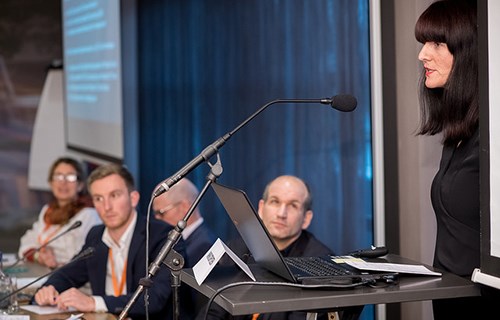International sports federations – breaking the monopolies

Nikki Dryden and panel during a session on athletes' rights. Photo: Thomas Søndergaard/Play the Game.
27.11.2017
By Marcus HoyThe international nature of sports federations means that athletes are often not protected by the same national workplace laws as other employees. Instead, sports federations are able to impose rules that, in other workplaces, would be seen as breaching human rights. Such rules include the denial of free speech, a lack of independent representation, and strict and outdated dress codes.
While major issues remain, athletes and academics told the conference, recent reforms offer hope for the future.
Speaking at Play the Game 2017, Olympic athlete and attorney Nikki Dryden said that sport has “lost the trust” of many nation states. When disputes arise, she said, athletes are forced to use arbitration procedures imposed on them by the sports associations or the Court of Arbitration for Sport (CAS). In such cases, she pointed out, the result must be accepted even if it is not in line with national law. Often, the rules of the sports bodies outlaw any criticism by athletes, while athletes’ representative committees offer little support.
However, Dryden added, significant changes have taken place over the past three years. Despite a lack of interest by traditional trade unions, she said, a growing number of professional athletes are asserting their human rights through new grassroots organisations.
Global bodies such as FIFA and the IOC have incorporated UN-defined human rights into recent declarations and charters, and human rights guarantees will be required from any nation tabling a bid to host the Olympic Games from 2024. While they have not taken the lead, she said, corporate sponsors such as Coca Cola and Adidas have been quick to embrace the changes. However, despite these well-publicized reforms, sport bodies are in many cases still able to operate separately from legal systems across the globe.
Numerous labor disputes
Professor Jürgen Mittag of Cologne’s Institute of European Sport Development and Leisure Studies, pointed out that numerous labour disputes exist in sport related to issues such as working conditions, drug testing, gender equality and the status of young athletes.
Recent developments in the field include the decision of the IOC to ban two Russian Olympic skiers for life on the basis of a report as opposed to positive drug tests. Danish football’s governing body was forced to cancel a women’s football match against Sweden due to protests from players about unequal payments, and the formation of a grassroots association by German athlete Silke Kassner. Team sports, Mittag said, were likely to take the lead in the future. While athletes are increasingly seeking to assert the rights that other employees already enjoy, he said, the sports associations will likely be reluctant to surrender their power.
Sport associations are often monopolies, Maximilian Seltmann from the German Sports University Cologne told Play the Game 2017, and are thus in a position to impose unfavourable rules on athletes.
If they do not agree to these rules, he said, athletes may face sanctions or be banned from competition. In many cases, he said, the monopoly enjoyed by the ruling bodies means that athletes are not able to work elsewhere. As they are less likely to be banned, he said, the biggest stars of the sporting world have the power to lead by example and empower athletes lower down the scale.
Lead by example
Brendan Schwab, Executive Director of the World Players Association at UNI Global Union, referred to a continuing human rights crisis in sport, in areas such as sexual abuse, the denial of free speech and the treatment of stadium construction workers. Internationally recognised human rights should always apply to sport, he said, including the right to free speech, the right to organise and the right to bargain collectively. While sporting organisations can be regarded as monopolies, he said, they can be prevented from acting in an anti-competitive manner.
“At least on paper, we are beginning to see sport move towards human rights commitments,” he said.
“Players want an equal say and have a right to be represented by a person or organisation of their choosing.” Existing athletes’ committees and commissions are often not truly representative of the athletes, he continued, as such committees have strong links to the governing body, and their members often hold or aspire to positions in the governing bodies.
Author and journalist Laura Robinson detailed the ongoing struggle of Canada’s indigenous population for official recognition of what she described as systematic sexual abuse by a member of the Canadian sport’s ruling elite.
Bemoaning a lack of response from official sports bodies to requests for an investigation, Robinson expressed her hope that Canada’s adoption of the UN’s Declaration on the Rights of Indigenous Peoples (UNDR) would finally allow their voices to be heard.

Read more about Play the Game 2017





